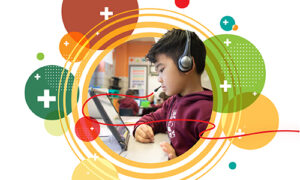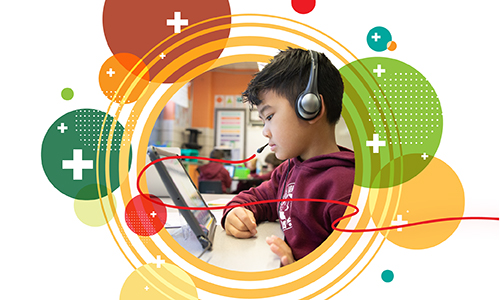

Webinar
Is there an early literacy crisis? How science and data can help
Our early reading experts discuss the roots of the literacy crisis and provide research-backed strategies for helping early readers catch up and closing gaps in literacy equity and access.
Topics: Literacy
Products: MAP Reading Fluency


Article
Guía para utilizar MAP Reading Fluency en el hogar
Vea esta guía para una descripción detallada paso a paso sobre cómo utilizar la prueba de fluidez de lectura MAP para su hijo(a) en casa.
Topics: Literacy


Article
Helping hesitant teachers embrace technology in the classroom
One-on-one reading fluency assessments may be familiar and commonplace in early learning classrooms, but there’s a better way. Learn more about the time savings, objectivity, and holistic data available with technology-based fluency assessments.
Topics: Literacy
Products: MAP Reading Fluency


Brief
Understanding the new Lexile Framework for Oral Reading
To build reading comprehension, kids may need support at different times in their journey. With the Lexile® Framework for Oral Reading, teachers have insight into what students need—and when—to successfully read grade-level text.
Topics: Literacy
Products: MAP Reading Fluency


Article
The science of reading and balanced literacy: What you need to know
Take a closer look at changes to the early literacy landscape as reading expert Dr. Cindy Jiban explores the advantages of the science of reading compared to the balanced literacy approach.
Topics: Literacy, Science of reading
Products: MAP Reading Fluency


Guide
Using Lexile measures to improve reading instruction
To become proficient readers, young learners need experience with written language at increasingly higher levels of difficulty. Learn how the Lexile® reading measures can help you support students with targeted reading instruction.
Topics: Instructional strategy & resources, Literacy
Products: MAP Reading Fluency


Article
5 reading skills kids need before grade 3
This list and summary will discuss the big 5 reading ideas that have to be taught and assessed prior to grade 3. The National Reading Panel identified five components at the core of effective reading instruction: phonics, phonemic awareness, fluency, vocabulary and comprehension. Hit on why this is so important at the early learning stages. List out each reading concept, explain what it is, and why reading research has identified it as important.
Topics: Instructional strategy & resources, Literacy, Science of reading
Products: MAP Reading Fluency